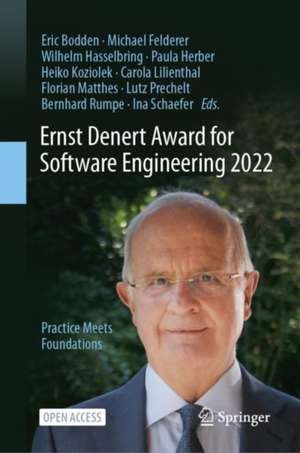Ernst Denert Award for Software Engineering 2022: Practice Meets Foundations
Editat de Eric Bodden, Michael Felderer, Wilhelm Hasselbring, Paula Herber, Heiko Koziolek, Carola Lilienthal, Florian Matthes, Lutz Prechelt, Bernhard Rumpe, Ina Schaeferen Limba Engleză Hardback – 28 mar 2024
The book contains five papers that describe the works by Jannik Fischbach (Netlight Consulting GmbH and fortiss GmbH), who won the award, entitled Conditional Statements in Requirements Artifacts: Logical Interpretation, Use Cases for Automated Software Engineering, and Fine-Grained Extraction, Christian Kirchhof's (RWTH Aachen University) From Design to Reality: An Overview of the MontiThings Ecosystem for Model-Driven IoT Applications, Sven Peldszus's (Ruhr University Bochum) research about Security Compliance in Model-driven Development of Software Systems in Presence of Long-Term Evolution and Variants, Florian Rademacher's (RWTH Aachen University) work on Model-Driven Engineering of Microservice Architectures, and Alexander Trautsch's (University of Passau) Usefulness of Automatic Static Analysis Tools: Evidence from Four Case Studies.
The chapters describe key findings of the respective works, show their relevance and applicability to practice and industrial software engineering projects, and provide additional information and findings that have only been discovered afterwards, e.g. when applying the results in industry. This way, the book is not only interesting to other researchers, but also to industrial software professionals who would like to learn about the application of state-of-the-art methods in their daily work.
Preț: 361.52 lei
Preț vechi: 451.89 lei
-20% Nou
Puncte Express: 542
Preț estimativ în valută:
69.17€ • 72.23$ • 57.12£
69.17€ • 72.23$ • 57.12£
Carte tipărită la comandă
Livrare economică 15-29 aprilie
Preluare comenzi: 021 569.72.76
Specificații
ISBN-13: 9783031444111
ISBN-10: 3031444116
Ilustrații: V, 176 p. 47 illus., 38 illus. in color.
Dimensiuni: 155 x 235 mm
Greutate: 0.44 kg
Ediția:2024
Editura: Springer Nature Switzerland
Colecția Springer
Locul publicării:Cham, Switzerland
ISBN-10: 3031444116
Ilustrații: V, 176 p. 47 illus., 38 illus. in color.
Dimensiuni: 155 x 235 mm
Greutate: 0.44 kg
Ediția:2024
Editura: Springer Nature Switzerland
Colecția Springer
Locul publicării:Cham, Switzerland
Cuprins
1. Ernst Denert Software Engineering Award 2022.- 2. Conditional Statements in Requirements Artifacts: Logical Interpretation, Use Cases for Automated Software Engineering, and Fine-Grained Extraction.- 3. From Design to Reality: An Overview of the MontiThings Ecosystem for Model-Driven IoT Applications.- 4. Security Compliance in Model-driven Development of Software Systems in Presence of Long-Term Evolution and Variants (Summary).- 5. Model-Driven Engineering of Microservice Architectures—The LEMMA Approach.- 6. Usefulness of Automatic Static Analysis Tools: Evidence from Four Case Studies.
Notă biografică
The editors consist of the scientific jury responsible for the selection of the nominees and the winner of the Ernst Denert Award for Software Engineering 2020. The book is edited in commitment by the Austrian, German and Suisse societies for informatics (GI, OCG, SI).
Textul de pe ultima copertă
This open access book provides an overview of the dissertations of the five nominees for the Ernst Denert Award for Software Engineering in 2022. The prize, kindly sponsored by the Gerlind & Ernst Denert Stiftung, is awarded for excellent work within the discipline of Software Engineering, which includes methods, tools and procedures for better and efficient development of high quality software. An essential requirement for the nominated work is its applicability and usability in industrial practice.
The book contains five papers that describe the works by Jannik Fischbach (Netlight Consulting GmbH and fortiss GmbH), who won the award, entitled Conditional Statements in Requirements Artifacts: Logical Interpretation, Use Cases for Automated Software Engineering, and Fine-Grained Extraction, Christian Kirchhof's (RWTH Aachen University) From Design to Reality: An Overview of the MontiThings Ecosystem for Model-Driven IoT Applications, Sven Peldszus's (Ruhr University Bochum) research about Security Compliance in Model-driven Development of Software Systems in Presence of Long-Term Evolution and Variants, Florian Rademacher's (RWTH Aachen University) work on Model-Driven Engineering of Microservice Architectures, and Alexander Trautsch's (University of Passau) Usefulness of Automatic Static Analysis Tools: Evidence from Four Case Studies.
The chapters describe key findings of the respective works, show their relevance and applicability to practice and industrial software engineering projects, and provide additional information and findings that have only been discovered afterwards, e.g. when applying the results in industry. This way, the book is not only interesting to other researchers, but also to industrial software professionals who would like to learn about the application of state-of-the-art methods in their daily work.
The book contains five papers that describe the works by Jannik Fischbach (Netlight Consulting GmbH and fortiss GmbH), who won the award, entitled Conditional Statements in Requirements Artifacts: Logical Interpretation, Use Cases for Automated Software Engineering, and Fine-Grained Extraction, Christian Kirchhof's (RWTH Aachen University) From Design to Reality: An Overview of the MontiThings Ecosystem for Model-Driven IoT Applications, Sven Peldszus's (Ruhr University Bochum) research about Security Compliance in Model-driven Development of Software Systems in Presence of Long-Term Evolution and Variants, Florian Rademacher's (RWTH Aachen University) work on Model-Driven Engineering of Microservice Architectures, and Alexander Trautsch's (University of Passau) Usefulness of Automatic Static Analysis Tools: Evidence from Four Case Studies.
The chapters describe key findings of the respective works, show their relevance and applicability to practice and industrial software engineering projects, and provide additional information and findings that have only been discovered afterwards, e.g. when applying the results in industry. This way, the book is not only interesting to other researchers, but also to industrial software professionals who would like to learn about the application of state-of-the-art methods in their daily work.
Caracteristici
This book is open access, which means that you have free and unlimited access Presents an overview of the five best theses in software engineering nominated for the Ernst Denert Award in 2022 Describes key findings of the respective works and shows their relevance and applicability to industrial SWE projects Provides information on how to apply state-of-the-art software engineering methods in daily practice
